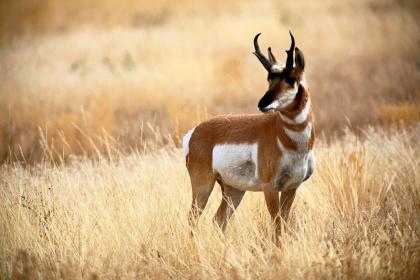Pronghorn antelope have always been a part of the Texas landscape, but what’s the future of this speed goat? Will pronghorn hunting in Texas continue or will the population decline witnessed over the past few years lead to the end of an already limited supply of pronghorn permits? Biologists are trying to answer these questions as we speak, as well as determine if additional stockings may be necessary and warranted. The Borderlands Research Institute (BRI) of Sul Ross State University and Texas Parks and Wildlife Department (TPWD) will host a March 6 seminar to discuss current findings of the Pronghorn Restoration and Research Project.
Pronghorn are one of the most amazing ungulates found in North American. This big game animal, with their distinct brown and white coloration accented by black cheek patches and glossy black horns, had become a fixture of the Trans-Pecos and the Texas Panhandle. The pronghorn is unique to the world and North America and is the only big game species that sheds it’s out horn sheath each fall.

The pronghorn is not in fact an antelope, but rather a member of the goat family. It’s lack of dew claws on the front feet give it this distinction. A pronghorn can attain speeds of 70 mph and cruise at 30 miles per hour for long distances. Their eyesight is phenomenal and compares to a human using 8X magnification binoculars. Living in open, windy, semi-arid country, pronghorns depend mainly on their acute eyesight to warn them of danger, but recent research has found that parasites may be their biggest problem.
The schedule pronghorn seminar will begin at 7 p.m. Tuesday, March 6 in the Espino Conference Center, Morgan University Center. Refreshments will be served and the public is invited. The purpose of the project is to identify causative factors associated with declining antelope herds and to restore pronghorn to their historic habitats in the Trans-Pecos. The pronghorn restoration seminar will provide an overview of the ongoing restoration efforts and an update of the research findings.
The Pronghorn Restoration and Research Project is a collaborative effort by the BRI, TPWD, Trans-Pecos Pronghorn Working Group, Texas landowners, and concerned citizens. For more information about the restoration project, call (432) 837-8488 or (432) 837-2051.